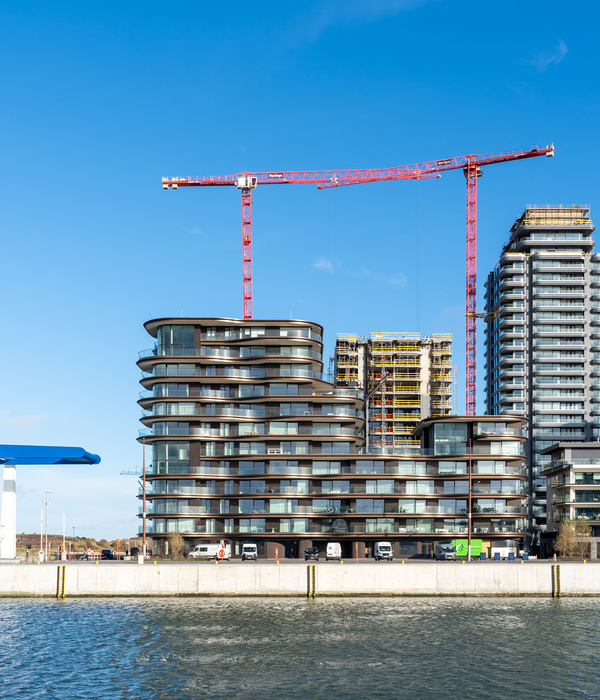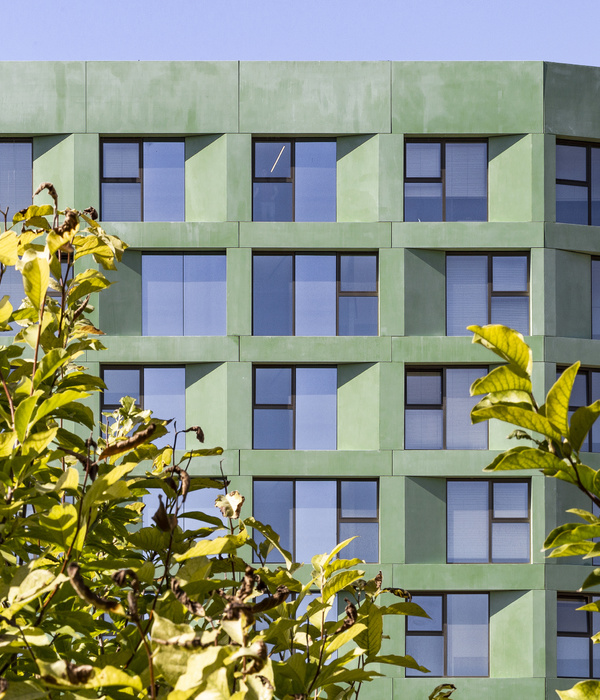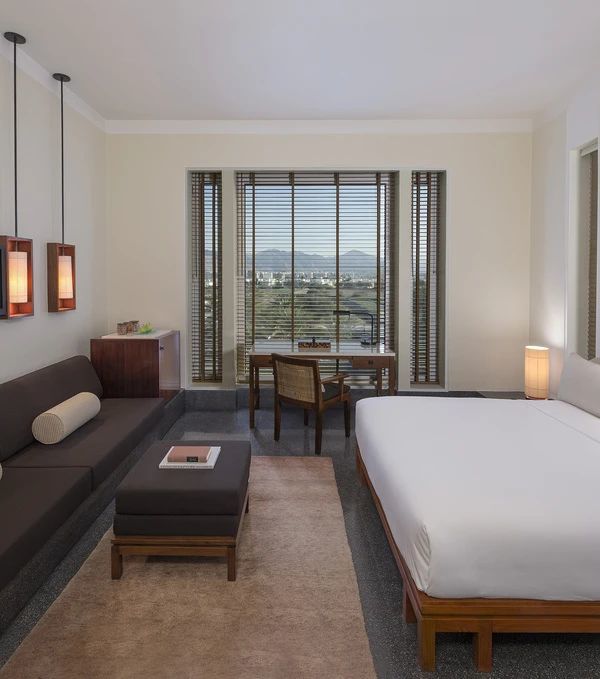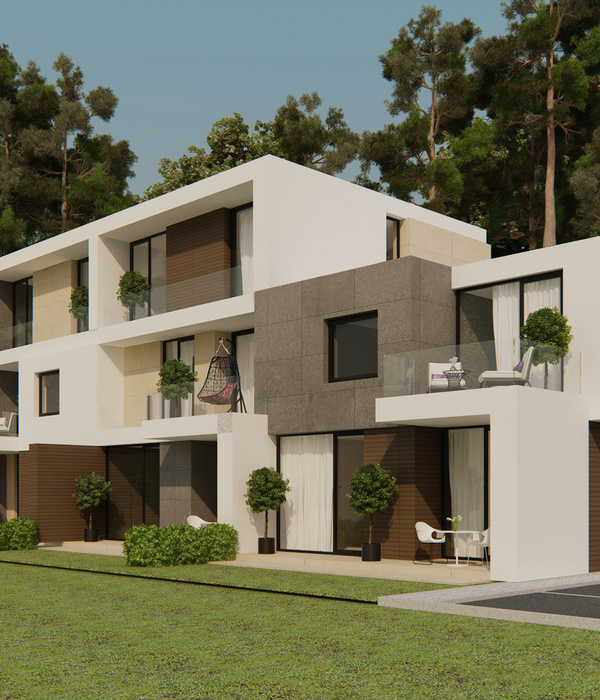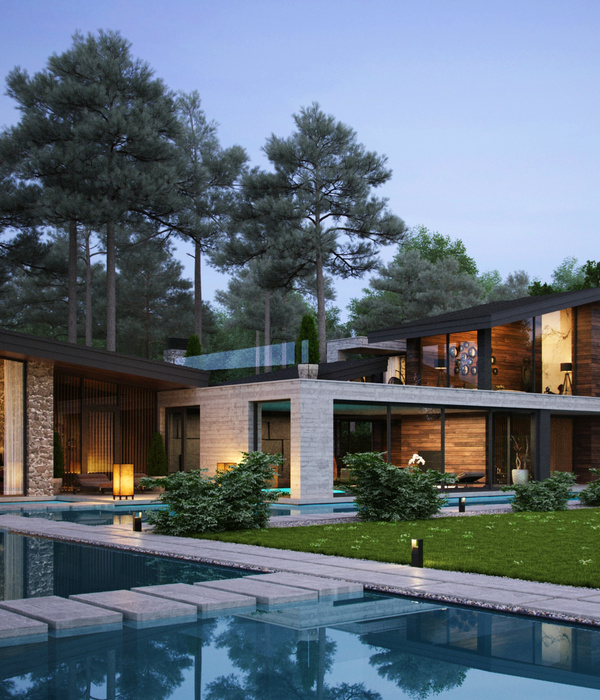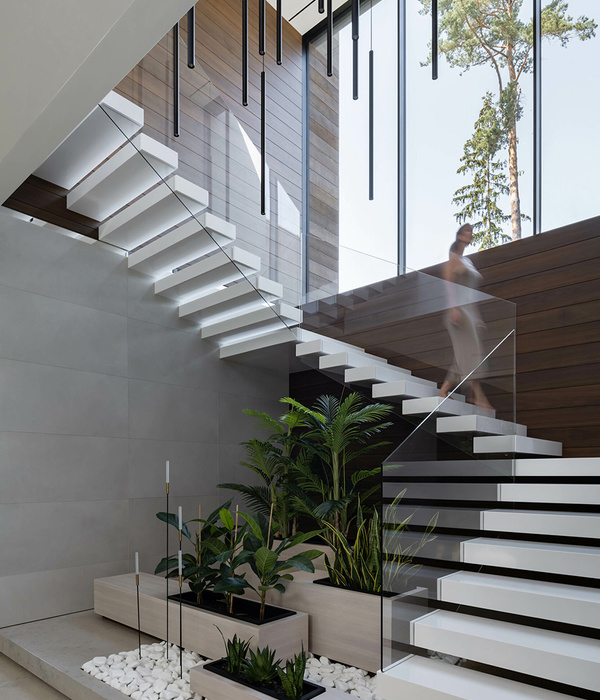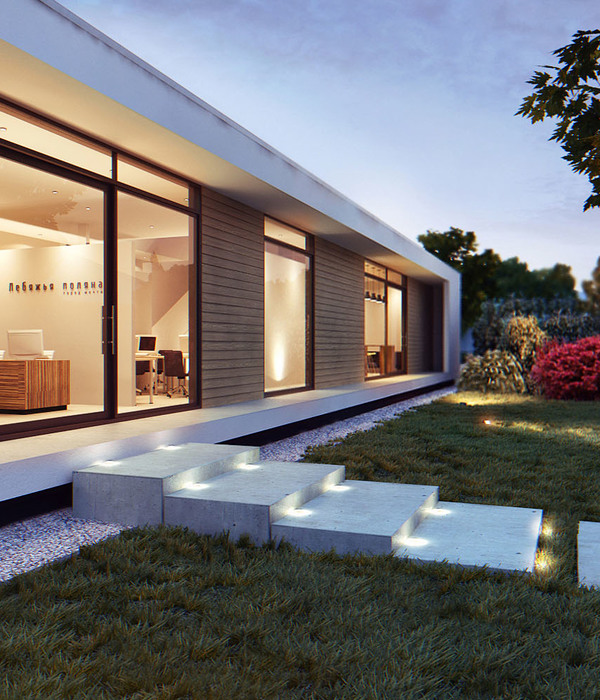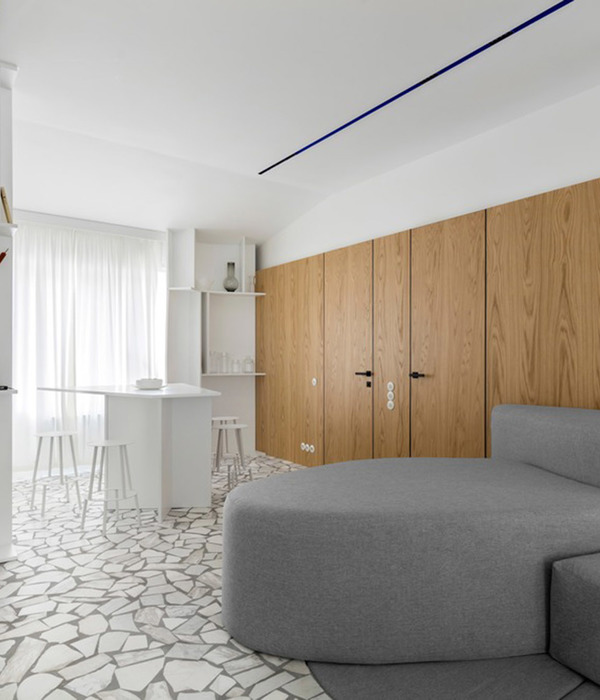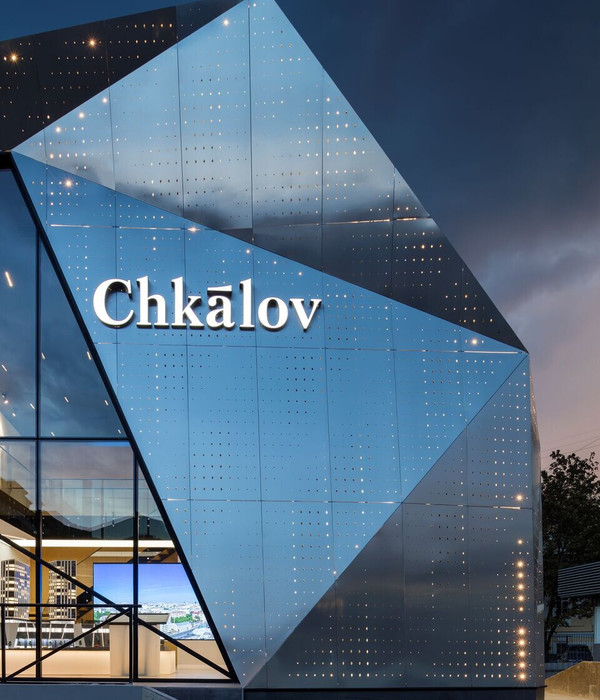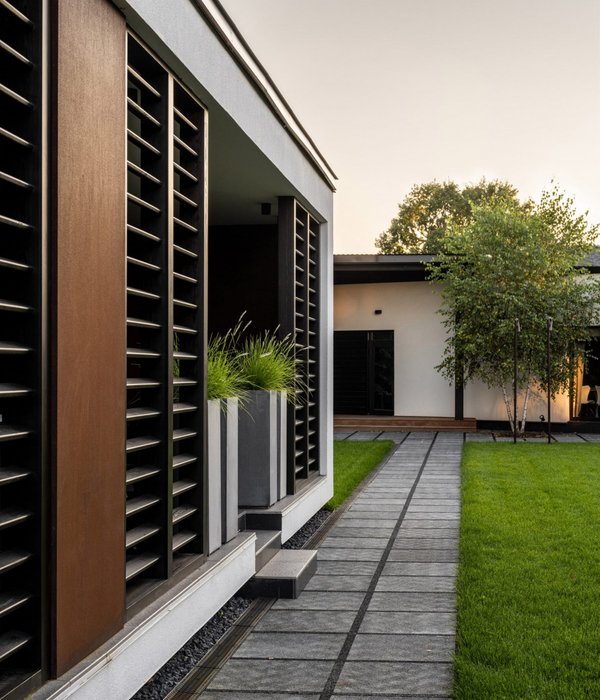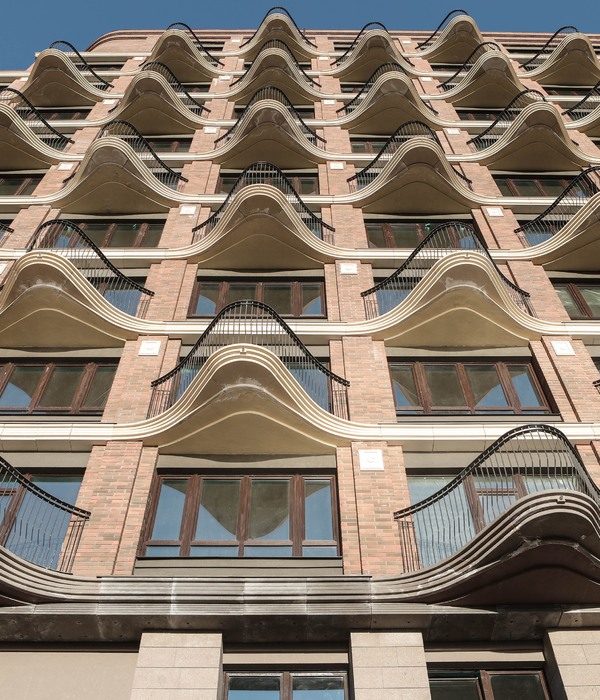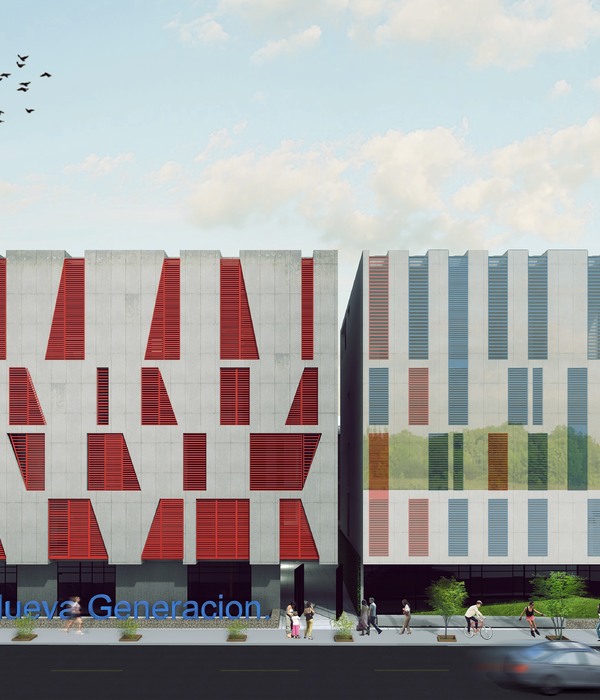布拉格的Masaryčka基于循环步道规划而设计,这将为城市提供通往新市政空间的通道。Masaryčka办公和零售开发项目占地28,000平方米,东区有七层,西端有九层,其办公空间旨在满足城市企业部门持续增长的需求,以满足 21 世纪的工作模式。
the Masaryčka building in Prague is defined by circulation routes which will provide access to new civic spaces for the city. Accommodating the continued growth of the city’s corporate sector with office spaces designed to meet 21st century working patterns, the 28,000 sq. m Masaryčka office and retail development incorporates seven storeys within its eastern section and nine storeys at its western end.
▼建筑概览,Overall view of the building ©BoysPlayNice
Masaryčka的设计与捷克铁路公司对历史悠久的Masaryčka火车站进行的现代化改造相结合,该火车站正在部分铁轨上方打造一个新的公共广场,Masaryčka的设计将增强下方铁路站台的可达性,并在车站两侧的Florenc和Hybernská之间提供新的步行路线。
Integrating with Czech Railways’modernisation of the historic Masaryk Railway Station that is creating a new public square partially over the railway tracks, Masaryčka’s design will enhance accessibility to the railway platforms below and provide new pedestrian routes between Florenc and Hybernská on either side of the station.
▼建筑与城市环境概览,Overall view of the building and the urban environment ©BoysPlayNice
▼由广场望向建筑,Viewing the building from the square ©BoysPlayNice
Masaryčka建在一个荒废了数十年的废弃场地上,南边是Masaryk火车站台,北边是Na Florenci街,东边是Wilsonova高架高速公路。在西边,Masaryčka用一个新的公共广场取代了Havlíčkova大道上的现有停车场,该广场在城市铁路、有轨电车和公交网络之间设有换乘站;为郊区和国内铁路乘客以及未来使用通往布拉格国际机场的快速铁路线(目前正在建设中)的乘客创建一个通向城市的迎客门户。
Bordered by Masaryk Station’s railway platforms to the south, Na Florenci street to the north, and the Wilsonova elevated freeway to the east, Masaryčka has been constructed on a derelict site that has stood abandoned for several decades. To the west, Masaryčka replaces the existing car park on Havlíčkova Boulevard with a new public square with interchanges between city’s rail, tram and bus networks; defining a welcoming gateway to the city for suburban and domestic rail passengers as well as those using the express rail link that is currently under-construction to Prague’s international airport.
▼由街对面望向建筑,Viewing the building from the other side of the road ©BoysPlayNice
▼立面特写,Close-up of the facade ©BoysPlayNice
Masaryčka位于市中心Staroměstské广场以东一公里处,其设计与被誉为“100座尖顶的黄金之城”的布拉格老城建筑和都市主义建立了对话。Masaryčka立面内的外部翅片有助于夏季遮阳,并将项目面向老城区尖顶的西立面从水平转变为垂直构图。
Located one kilometre east of the city centre’s Staroměstské Square, Masaryčka’s design establishes a dialogue with the architecture and urbanism of Prague’s Old Town – known as ‘the golden city of 100 spires’. External fins within Masaryčka’s façade contribute to solar shading in the summer and transform the project’s horizontal composition to the verticality of its western façade facing the spires of the Old Town.
▼建筑夜景,Night view ©BoysPlayNice
▼夜景立面特写,Close-up of the facade in the evening ©BoysPlayNice
Masaryčka致力于获得LEED白金认证,设计采用双层隔热外墙,确保所有工作区域和公共空间拥有最佳的自然光。连续性的露台将两座建筑分开,而东立面相似的露台使每个办公楼层都可以直接通往宽敞的室外空间。公共屋顶花园享有整个城市的全景。混合通风由配备可再利用能源回收系统的高效工厂提供支持,而建筑物的智能管理系统则不断监控和调整环境控制,以减少能源消耗。
Targeting LEED Platinum certification, Masaryčka’s incorporates a double-insulated façade that ensures optimal natural light at all work areas and communal spaces. A cascade of terraces divides the two buildings while similar terracing on the eastern façade gives every office floor direct access to generous outdoor spaces. Communal roof gardens offer panoramic views across the city. Hybrid ventilation is supported by a high-efficiency plant with waste heat recovery systems while the building’s smart management systems continually monitor and adjust environmental controls to reduce energy consumption.
▼多层次的露台,Multi- layered terraces ©BoysPlayNice
▼露台特写,Close-up of the terraces ©BoysPlayNice
Masaryčka雨水收集系统可提供水资源用于灌溉当地的植物、灌木和树木,同时用于将Na Florenci 改造成绿树成荫大道的工程,这将提供凉爽的夏季阴凉和净化的自然空气。低流量系统和污水回收将进一步减少该中心的用水量。
Planting using local species of plants, shrubs and trees irrigated by Masaryčka’s rainwater collection system, including the transformation of Na Florenci into a tree- lined avenue, will provide cooling summer shade and natural air purification. Low-flow systems and grey-water recycling will further reduce the centre’s water consumption.
▼标志性的入口,Symbolic entrances ©BoysPlayNice
Masaryčka的建设和采购优先考虑当地供应商和具有高回收含量的材料,以满足RIBA 2030 气候挑战制定的2025年隐含碳和运营碳目标。
Masaryčka’s construction and procurement has prioritised local suppliers and materials with a high recycled content to meet the 2025 targets for embodied & operational carbon established by the RIBA 2030 Climate Challenge.
▼入口立面,Facade of the entrance ©BoysPlayNice
捷克铁路公司对Masaryčka附近的Masaryk火车站进行的翻修工程将于2026年竣工,该工程保留了现有的历史悠久的总站建筑,并包括在部分轨道上新建的公共广场,以便通往各个站台并直接换乘布拉格地铁B线。将车站改造成一个完全无障碍的城市多模式联运枢纽,其现代化设计将目前的轨道数量从七条扩展到九条,并重建了所有站台、架空线路设备和电力供应系统。
Due for completion in 2026, Czech Railways’ renovation of Masaryk Railway Station adjacent to Masaryčka retains the existing historic terminus building and includes the construction of the new public square partially over the tracks giving access to individual platforms and a direct transfer to Prague’s metro line B. Transforming the station into a fully accessible, multi-modal transport hub for the city, its modernisation programme extends the current number of tracks from seven to nine and reconstructs all platforms, overhead line equipment and power supply.
▼流线型的大堂,Curve-shaped lobby ©BoysPlayNice
▼天花特写,Close-up of the ceiling ©BoysPlayNice
Architect: Zaha Hadid Architects (ZHA) Design: Zaha Hadid, Patrik Schumacher Competition Directing Associate: DaeWha Kang Project Architect: Jakub Klaska Project Team: Michal Wojtkiewicz, Malgorzata Kowalczyk, Fernanda Mugnaini, Matthew Carapiet, Bogdan Zaha, Chenxi Gong, Maya Boustany, Jan Klaska, Brian Dale Concept Refinement – Schematic Design Project Director: Jim Heverin Directing Associate : Craig Kiner Project Architects: Jakub Klaska, Sara Sheik Akbari Project Team: Javier Rueda, Jan Klaska , Saman Dadgostar, Yifan Zhang, Moa Carlson , Juan Montiel , Carlos Parrada-Botero, Monika Bilska, Harry Spraiter, Ovidiu Mihutescu, Niran Buyukkoz, Nan Jiang, Horatiu Valcu Detailed Design Project Director: Jim Heverin Project Architects: Jakub Klaska, Victor Orive Project Team: Harry Spraiter, Javier Rueda, Aiste Dzikaraite , Sven Torres, Muriel Boselli , Maria Touloupou , Thomas Bagnoli Construction Design Project Director: Jim Heverin Project Architect: Jakub Klaska Project Team: Harry Spraiter, Aleksandra Mnich-Spraiter, Devansh Daisaria
{{item.text_origin}}

